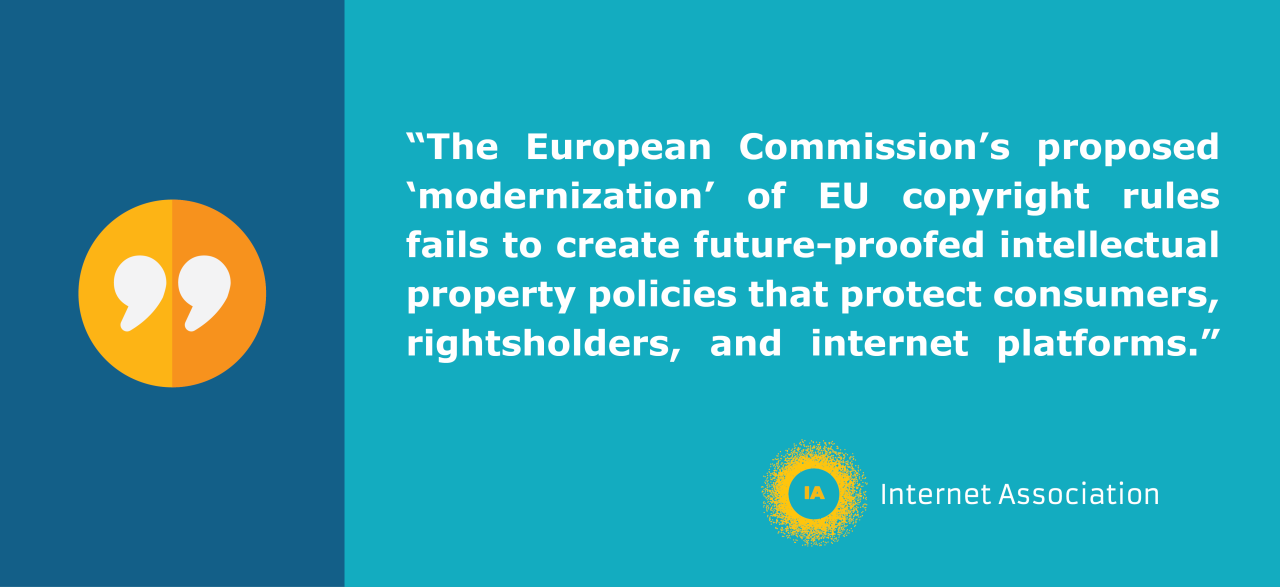
The European Commission’s proposed
“modernization” of EU copyright rules fails to create future-proofed
intellectual property policies that protect consumers, rightsholders, and
internet platforms. The adoption of these provisions would slow the growth of
homegrown internet companies across the European continent and could be disastrous
for the European publishing community.
The EU copyright consultation presented an opportunity for
the Commission to embrace a digital future, support EU startups, and foster
innovation and growth, instead, the Commission has chosen to side with the past
by protecting legacy industries from digitization. Should the proposals proceed
as currently drafted, the real losers here will be EU citizens and consumers as
well as EU startups who will fall behind in the global marketplaces in which
they compete.
The EC’s proposed “modernization” effort should take the
following five arguments into consideration:
1. Prior failures
prove negative impacts of ancillary copyright laws.
The new EC copyright proposal includes a proposal for new
“neighboring rights,” or so-called ancillary copyright, which are laws forcing
internet aggregators to pay press publishers to display excerpts in search
results. Rather than protect creativity, these laws act as a stealth tax on
internet aggregators that create economic and legal barriers to entry, bringing
harm to consumers, publishers, and internet companies alike. Existing ancillary
copyright laws in Germany and Spain have been devastating (see here
and here).
These provisions increase the search costs and time commitment for consumers by
making it harder for consumers to access news and other forms of information from
aggregators, apps, blogging services, social networks, and other online
services. In Spain alone, these provisions cost consumers an estimated EUR 1.85
billion per year. Worst of all, these losses disproportionately impact smaller
publishers who rely more heavily on online services to drive traffic rather
than brand recognition.
2. Startups will
suffer and innovators will face higher barriers to entry.
In their attempt to favor legacy industries, the EC’s
proposal includes provisions that create new, disproportionate barriers for
startups to scale and diversify in Europe. The new proposal would require
digital companies to police the internet through filtering mechanisms. Internet
companies agree that fighting piracy is a worthy goal – that’s why companies
are making investments to drive consumers to legal content and provide rightsholders
the tools they need to identify infringing works. However, one-size-fits-all
proposals just won’t work: there’s no silver bullet to fight piracy
and requiring all companies to make investments up front (like YouTube’s
ContentID, which cost about $60 million to start) will just ensure that only
large, established players can offer services in Europe. Startups lack the
capital to support sophisticated compliance teams and monitoring platforms, meaning
smaller businesses will be left in limbo under the proposed regulations. This creates
particularly significant problems in the European Union, where high
unemployment and slower growth have plagued member-state economies in recent
years.
The harm done to internet startups will have effects on
creators and the public as well: the scale and diversity of internet companies
ultimately lowers barrier to entry for artists who can access global markets at
the touch of a button. When new platforms fail to launch and grow in a market,
those artists won’t have the resources to compete on a global stage. The public
suffers too: not only will Europe further disadvantage itself as a home to entrepreneurs
and innovators, but the public will also have less to choose from online.
3. Filtering obligations
create speech rights concerns.
A requirement that publishers and content hosts deploy
advanced monitoring and filtering systems that enable intermediaries to monitor
pieces of content indefinitely suppresses speech and installs censorship
regimes online. Content that is infringing in one context may be legal in
another. Filtering rules in the proposed copyright package create significant
risk of indiscriminate content takedown and directly contradicts the spirit and
goals of the speech rights included under the European Convention on Human Rights.
4. If it ain’t broke…
In light of these glaring liabilities, we must ask the
question: What is wrong with keeping the current eCommerce directive provisions
the way they are? They have helped eCommerce grow rapidly throughout the
European Union by allowing online intermediaries and startups to pursue capital
amid legal certainty. The preservation of that certainty will ensure European
startups avoid the challenges of attracting investment since there is a proven
positive relationship between clear intermediary liability rules and capital
investment. Online news aggregators help to drive traffic to publisher’s sites
and foster the free and easy accessibility of information for users across the
world. Internet companies are global leaders in fighting piracy- the law can’t
keep pace with technology, and allowing parties of varying scale and purpose to
work collaboratively is key to creating private-sector mechanisms that work for
all parties.
The newly
proposed provisions are meant to protect intellectual property and fight
piracy: unfortunately, they accomplish neither, instead harming those they
claim to help.
5. The proposed
changes may be in violation of international agreements.
The EU operates under the positive obligation set forth in
the Berne Convention, which allows anyone to quote from a work that is
publically available. This international agreement has been in place since 1886
and expressly allows people and companies to quote from copyrighted works. The
United States Trade Representative has already been tracking the issue,
announcing earlier this year that as “parts of the EU publishing industry
are advocating adopting similar measures EU-wide, which will likely have a
negative effect on many U.S. stakeholders, this issue bears careful
monitoring.”










